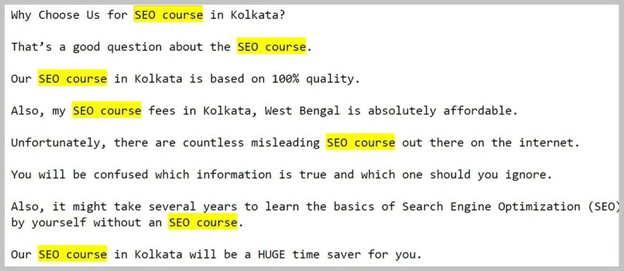Do you still rely on the traditional method of listing your website’s link on online link directories? Wow, you must still be living in the last decade.


Somebody once said, “The best place to hide a dead body is the second page of Google search.”

You know why that is so?
Because nobody checks anything beyond the first pages of Google. In other words, if your page or site sits beyond the first page, nobody will see it.
And you know what condemns a page/site faster to the second, third … and subsequent pages of Google search?
Deploying outdated SEO practices.
Unfortunately, many marketers and business owners still deploy outdated SEO practices. I’m guessing because they don’t know.
Anyways, it’s the job of people like me – who are in the know – to help put things right. That said, below are 7 SEO practices that no longer work.
First of all, let me ask you this: How do you go about your link building process?
Do you still rely on the traditional method of listing your website’s link on online link directories? Wow, you must still be living in the last decade. Didn’t you get the update when Google's John Mueller said that “Generally, web directories do not help with SEO or rankings?”
The reason Google says this is because they’ve discovered that people now put up links in directories that are entirely outside the scope of their niche. As a result, most directories are now filled with spammy and useless content.
If at all you must use directories, please stick with high-quality, niche-specific directories that Google trust. For example, Yahoo, Spoke.com, About Us, Yelp, Yellow Pages, Google My Business, etc.
But if I were you, instead of link directories, I’d rather use a guest post service to find and build quality backlinks to my site.
As with links, people also list their articles on directories. Originally, the idea was for people to share their pieces with a wider audience.
But recently, many webmasters and marketers have abused the process. What they do, now, is they use bots to “rewrite” their articles and submit them to thousands of article directories at a time. In the end, these directories become flooded with low-quality, plagiarized content.
Since Google discovered this act through the Panda Update in 2011, it stopped giving relevance to article directories. The result? Article directories have now become a wasteland.
Gone are the days when people ranked on Google SERPs regardless of the quality of their posts. I mean, I could remember reading blogs with lots of spelling errors, plagiarism, and grammatical blunders some years back.
Today, those practices don’t work.
You can’t expect to steal someone’s work, spin it, and then rank on Google’s first page. No, that won’t happen. Google’s algorithm is so evolved that it spots low-quality content even from a mile away.
If you want to rank on the SERPs, you need to constantly deliver valuable, well-written, and engaging pieces. That’s the only secret to success.
1000 words, 500 words, 2000 words, there’s really no word limit. Let no one tell you otherwise. Google wants you to deliver something that answers users' queries. If you need 5k words to do that, then so be it.
Finally, everybody knows how time-consuming and strenuous content creation can be. Luckily, there are so many AI-powered content creation tools on the market today. And before you ask, yes, these tools write like humans. So, there’s no cause for alarm.
Another practice that has stopped working is the use of Exact Match Domains (EMDs). For many years, marketers and webmasters would create domain names with the exact keywords they’re trying to rank for in Google SERPs.
For example, if someone was trying to rank for the keyword health insurance, they would create an EMD with the domain healthinsurance.com. Now, when someone comes to search for health insurance or something related, their site would pop up, regardless of whether it provides a better answer to the user or not.
Lots of webmasters and masters used this strategy to game the Google algorithm for many years. And they reaped the reward by ranking faster than sites with normal domains.
Many years later, Google introduced the Exact-Match Domain Update, which killed off this strategy. With this update, Google is able to look beyond just a site’s domain name. They now prioritize other important factors.
If there’s anything Google hates the most, that would be a quid pro quo – the practice of something for something.
For many years, webmasters and marketers dabbled in the practice of reciprocal linking. The idea was “I would link one of my content to you,” and you’ll, in turn, “link one of yours to me.”
This practice became so prevalent that people would even link to completely irrelevant sites.
But after a while, Google got wiser. Today, it penalizes anyone caught in the act.
Many today are still of the opinion that guest blogging is dead.
Well, they’re wrong. And if you’re one of them, you’re wrong, too. Guest blogging is far from dead. What is dead, however, is your approach to guest blogging.
Thinking you’re smart and trying to game the Google algorithm with your guest blogging strategy – that’s what’s dead, my friend.
Imagine someone whose business is about smartwatches submitting a guest post to a construction blog and then subtly inserting his link somewhere in the piece (sometimes in the bio area). That’s what’s dead, bro.
Guest blogging is about identifying sites/blogs that are cut from the same clothes as yours and then publishing a post there.
Google doesn’t want traffic coming from a construction blog into a PS5 site. Come on, where’s the correlation in that? They want your guest blogs to be providing actual values to people that really need them. Then and only then will your backlinks be reckoned with.
In other words, limit your guest posts to highly relevant, high-quality, industry-related sites only. If you can’t find them, hire a guest posting company to help you.
Gone are the days when keyword stuffing only referred to the practice of using the same word(s) in an article repeatedly. Nowadays, Google considers the constant repetition of relating keywords as keyword stuffing, too.
In other words, it’s not only when your article is filled with Online Course that Google will flag you for the practice of keyword stuffing. If you fill up your piece with words like e-course, digital course, etc., it will still be considered stuffing.
And that will impact your search ranking.







